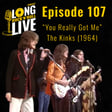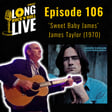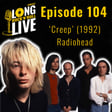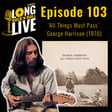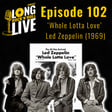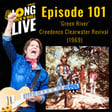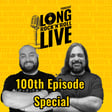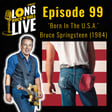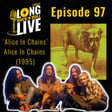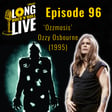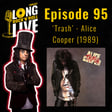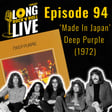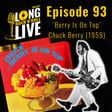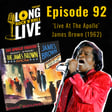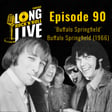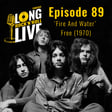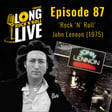Become a Creator today!Start creating today - Share your story with the world!
Start for free
00:00:00
00:00:01

105. 'Odyssey' - Yngwie Malmsteen (1988)
Following rising pressure to reach mainstream rock audiences, Yngwie Malmsteen returned with a vengeance — and an album that would forever reshape the landscape of shred guitar and neoclassical metal. Released in 1988, Odyssey is a masterclass in technical brilliance, melodic hooks, and bold ambition. Featuring the soaring vocals of former Rainbow singer Joe Lynn Turner, this album fused lightning-fast virtuosity with commercial rock accessibility like never before.
Episode Playlist: https://open.spotify.com/playlist/7blSkZNHq06aBY4fA9IjKj?si=641f0931b68c411c
#YngwieMalmsteen #Odyssey #GuitarGod #NeoclassicalMetal #ShredGuitar #80sRock #PowerMetal #JoeLynnTurner #GuitarVirtuoso
Transcript
Introduction and Album Choice
00:00:00
Speaker
What do you get when a Ferrari driving guitar shredder teams up with a rainbow vocalist, survives a coma, and tries to bring Baroque music to the Billboard charts? You get Yngwie Malmsteen's Odyssey album, an album that changed metal forever.
00:00:16
Speaker
Welcome back to the Long Live Rock and Roll podcast with myself, Laz Michael Leavis, and my co-host, Mr. Felipe Ameren. How are you doing, bro? Doing great. Hello, everyone. Hope you guys doing well. Good, good, good. um Now, despite what viewers may think,
00:00:29
Speaker
I didn't choose this album today. do you A metal album that Laz didn't choose. Yes, Felipe chose this album today, which, but guys, it surprised me as much as you. So, you know, well let's let's find out. Felipe, what was the thinking behind it? How come you chose this album?
00:00:43
Speaker
I just thought... Well, you know, ah back in the day when I started playing music, every guitarist I know was into Malmsteen and everyone wanted to be capable of playing at least one bar of one of his songs. and That was the thing, like, if he could play any of his music, that means you're a great guitarist. That was the kind of stuff that people were into.
00:01:05
Speaker
And i think I just think, like, his... um His music is is part of rock history in a way, because he really, really pushed the boundaries for the for guitar playing.
00:01:15
Speaker
And he became just kind of a weird, kind of a creepy character in a way that a lot of people dislike. And he's like Nigel Tefano in a way.
00:01:27
Speaker
know you if you watch any of his interviews but the reason why I chose the album was this his best selling album is maybe not the album that reflects his his music the best I think he's got well proper proper metal albums yeah sound more like the stuff that the fans like but this is the the biggest commercial hit and I think his kind of again it's not my cup of tea this kind of music but I really admire people who can play to that level and I think that's that's the reason why cool well, let's talk about the album details then before we go into it. So the album was released on the 8th of April, 1988, recorded at a number of studios in the Cherokee in Hollywood, House of Music in West Orange, New Jersey, and Studio D in Austin, Texas.
Yngwie Malmsteen's Personal Journey
00:02:10
Speaker
The genre is heavy metal or more specifically neoclassical metal. It clocks in at just over 50 minutes long and was released on the Polydor label and produced by Ingeve Malmsteen, Jeff Glixom and Jim Lewis.
00:02:23
Speaker
um You're going to take the you're going to take the the us through this episode, but the one thing we didn't put in our little categories when we sent to each other is I completely forgot about his car crash in a coma. Oh, yeah. So just a little bit about of information on that as a bit of background. So in 1977, he was driving his Jaguar in Los Angeles and crashed it.
00:02:40
Speaker
ah The accident left him in a coma for nearly a week where he suffered really, really bad nerve damage, didn't he? And, the you know, the doctors thought he would never play um guitar again. Yeah, I think his his right arm wasn't yeah working for a few days. His picking arm, yeah. But he went through serious amounts of rehab and obviously, you the determination...
00:02:59
Speaker
i think I think all you've got to do is listen to this album listen to anything that he's done and realise that you have to have a certain level of determination to get that good at the guitar in the first place.
00:03:10
Speaker
And do does it did anyone really think he would stop just because he had a car crash? Like, I mean, like, you know, you say, you know, go through... through imagine Imagine building up to that level again.
00:03:22
Speaker
yeah As I said, how hard it is to achieve that level of guitar playing from scratch. And imagine you got to a point you can't move your arm and you can't play, you just came out of a coma and you think, you know, what should I do now? I'm going to go back to to the same level it was before. That is a hell of an achievement for sure.
00:03:39
Speaker
And then a bit of a poignant way to end this miserable section is that his mother apparently played him a voicemail from his father who had passed away um while he was unconscious. And Yngwie says he remembers he remembers it and he credits that moment with him ah coming back from his coma, which kind of a bit more on the spiritual side of things. Yeah. um But yeah, and then Odyssey was his first album post-coma. And I think, you know,
00:04:03
Speaker
it kind of reflects a little bit more. So I've read that it reflects a bit more. I would think that in the 80s, that would have been a tape rather than a voicemail. Yes, possibly. But they've been in the 80s, didn't they record voicemails onto tapes in the yeah the phone machine? Something like that, yeah. I don't know.
00:04:18
Speaker
Anyway, you take us
Band Members and Vocal Contributions
00:04:19
Speaker
through the albums. are we starting with? So we're going to start with, well, let's talk about the band because it used you you said everything it has to be said about the ah the album and how well it did, wasn't it so what um So the musicians in the band, so um right if I'm wrong, but there's two brothers in it, right?
00:04:37
Speaker
Two brothers. Well, they have the same surname. The Johansson. Yeah. ah Jens and Anders, they are the the keyboard player and the drummer. And Malmsteen plays the bass on kind of half of the album and has Bob Daisley playing in some of the ah ah of the tracks.
00:04:54
Speaker
And we need to talk about Joling Turner, who is the singer. thing with this kind of music for me is it's mainly about the guitar. And Malmsteen could have a...
00:05:05
Speaker
ah because he could have a whole career playing instrumental music would say like joseph triani like steve vi those guys do yeah and he actually played with them on the tour to do the three of them really yeah and uh but i think maybe because he wanted to be more accessible in a way or maybe because if you just shred the guitar for two hours on the gig people get bored i don't know why Or maybe because his actual major influences were guys like Richie Blackmore and Jimi Hendrix, people who play in bands with the singer.
00:05:38
Speaker
yeah So he always always had a singer in the band, although there's a few instrumental tracks in the album. but So to bring a singer into a band that is led by guitar player and has the name of the guitar player in it.
00:05:49
Speaker
So it's a tricky thing to do because like imagine being a singer and not being at the front man. Yeah. Because that's that's that was Jolene Turner's job, to to make Malmsteen's music sound better, to bring melody to it, to bring lyrics to it, without ever ah taking the spotlight out of the guitar.
00:06:11
Speaker
Yeah. And to make music accessible, where do you have to come from? You come from a band like Rainbow, who themselves played a big part in heavy metal only 10 years before. Now, was with a different singer. It was with Ronnie James Dio.
00:06:23
Speaker
But we discussed, we did the album Rainbow Rising. I think that was episode 76. um But we discussed that actually, and that was a significant album for the same reasons. Richie Blackmore taking a lot of neoclassical or classical music phrases and putting them into extended um hard rock pieces. And that would sort of form the basis for things like progressive metal to come in the future.
00:06:45
Speaker
um But yeah, anyway, you see, the nice little comparison there, isn't it, Richie Blackmore and Joe Lynn Turner coming from Rainbow. um But yeah, you're absolutely right. I think um So Joel and Turner sang with Deep Purple after this in 1989. It's the album Slaves and Masters from 1990, I guess. So I think he toured in 89 with them.
00:07:05
Speaker
um and recorded Slaves and Masters in 1990. I think it wasn't well received by the fans because everyone, you know, ah people got used to first Ian Gillan, then David Coverdale and Glenn Hughes.
00:07:18
Speaker
Too much of a change. Yeah, exactly, I think. But but a anyway, um yeah, so this destiny is that but kind of ah um strengthens that connection between Blackmore and Mount Sting, isn't it Exactly, yeah.
00:07:31
Speaker
um But i was just going to say, I completely agree with you. Joe Lynn Turner, what he bought was such was such ah an important level of accessibility to the album because, you know, he had this this melodic sensibility about him, which really kind of, I'd say almost softened the songs. Because if you listen to half of those songs, they are out and out speed, shredding, difficult to play riffs. They're kind of like razor edge metal music.
00:07:58
Speaker
But to have vocals like that sitting over them, it's almost a bit oxymoronic. You have something so a chaotic, fast, heavy here, and then his beautiful, simple, melodic vocals on the other side, and they work really well. They complement each other, don't they?
00:08:11
Speaker
Yeah, they do. And I think, yeah, again, again ah it it makes it a little bit less about the guitar and more about the music. It could have been overwhelming. Yeah. The whole album could have been. Do you know what's funny? Because i I don't like the guitar shredding thing, so I thought by listening to this album start to finish, I would feel like overwhelmed by the fifth track or something. But actually, never felt like it was too much in a way, because there's some cheesy stuff in there that I just, you think, oh my God, this is too 80s.
00:08:41
Speaker
And the guitar comes in and, okay, that's metal. that um Yeah, it's a bit different. right But the vocals, they really made the album for me. I think more than anything else. I think Jolene Turner did a phenomenal job in this album.
00:08:55
Speaker
I um ah think like, should give one example. I think it's track. Let me see. Oh, it's the second one. Hold on. Yeah, the song Hold On.
00:09:07
Speaker
It's a bit like ah cheesy love ballad and ah the kind of lyrics that they use on that one my heart cries for you that kind of stuff is not really my kind of music but the vocal performance is so good yeah it's like it makes that song i think that song could have been an awful track in the album but if it wasn't for the vocals yeah the one song that i one of the two songs i really didn't like but Actually, in the end, I liked it because of the vocals. I agree with you. and i think another two that his performance makes the song far better than it could have been was Crystal Ball and Deja Vu, ah two others that I thought really were just were were were made perfect for the album with his vocals.
00:09:51
Speaker
Yeah. um But yeah, I mean, what a performance, you know, really does tie in and and finds that beautiful balance. Because I think you're on the verge, musically, of it falling only into glam metal.
00:10:04
Speaker
Yeah. But because we have that technicality, that shredding, that neoclassical vibe to it, it really does sort of fall into more of a heavy metal
Musical Style and Influences
00:10:12
Speaker
aspect. you know Despite some of the Guitartos and the production, which we're going to talk about later, I would liken this more. We discussed it before, Ozzy Osbourne in the 80s.
00:10:21
Speaker
um yeah You've got him on one side of metal, which is actually the heavy metal moniker attached to it and then you've got glam metal on the other side. They don't sound too different, no but it's about the attitude. And I think Yngwie's attitude here is not about the look, talking about, you know, having sex with your teacher, not this and not that. He's way more on the musicality.
00:10:43
Speaker
way more push He's way more pushing towards the the the musicality side of it. Yeah, exactly. And and again, ah with a singer like that, you can you can really um sound like a metal band.
00:10:55
Speaker
Yeah. You wouldn't do that without a singer who can couldn't reach those notes to start with. The vocal range is impressive. Very good, yeah. I thought he did great the album, yeah.
00:11:07
Speaker
Yeah, no, all of it. He's the one guy that really shines on every track, I'd say. Yeah. apart Apart from Yngwie. Don't let Yngwie hear say that. yes what sure yeah,
00:11:19
Speaker
Cool. So talking about him, um I think the next topic is his influences, isn't it? Let's do it. am am i following the yeah Am I following the script correctly? You lead it, bro. It's your album. So, yeah. um So there's the inevitable comparison with Richard Blackmore, um which I said ah right at the beginning. But that comes...
00:11:41
Speaker
For me, because it his look is kind of the same. but here The hair, the clothes, guitar. Yes. The color of the guitar. Yeah. And as you think, sorry, I was going to say, when you went from Ritchie Blackmore's era, which was early 70s, guitar has changed so much. The look of a guitar, the different styles of a guitar. And it shocked me when I sort of started digging into Yngwie to see that he used a strap.
00:12:07
Speaker
yeah And then I think, ah, well, it must be the obvious influence of Ritchie Blackmore. Yeah, exactly. And he would kind of sometimes deny influences and stuff, but he always, um again, he's a bit of a spinotop character, so he would say, I have no influence from any guitar players, it's just classical music and stuff. yeah and then But he shows his admiration for Blackmoor more than once in in a few interviews.
00:12:32
Speaker
And one interview he did, I think, for the Swedish TV, he said something about like when he was eight years old, he got the album Fireball by Deep Purple.
00:12:42
Speaker
And that's what changed his life. So that's the one. So the influence is there. And you kind of never get away from your early influences as a musician. I think every musician can say that. If you started like as a heavy metal guitar player, one day you decide to go into jazz music, you still have that metal thing or even if it's the other way around. yeah And I think he could never get away from that influence. But the thing is,
00:13:06
Speaker
um It looks too similar in a certain way. So that's why people compare and ah the style as well, bringing classical music classical music into rock. But I think he's even more technical and faster. That's the thing. That's what is impressive about him.
00:13:21
Speaker
I watched an interview with ah Richard Blackmore about him and it was going on about the fact that a bit creepy to him, but this all those similarities, right? Interesting.
00:13:32
Speaker
but he The biggest compliment he gave to Malmsteen was, he's not an idiot.
00:13:39
Speaker
He basically said, yeah, you know, when you first see him, you think he's an idiot. It's like, it's a bit creepy with all the style and stuff. yeah But when you hear him playing, he's not an idiot. You can tell that.
00:13:50
Speaker
And, okay, one more thing about that is ah when they they met a few times, apparently, the first time they had a beer together, and Malmsteen said he he played on on Richard Blackmore's guitar,
00:14:02
Speaker
and that they talked about music and stuff. Um, the interviewer was like, so how was it for you? Like, cause you met your childhood hero. How was it? And said, no, he behaved more like a fan than I did.
00:14:15
Speaker
Wow. Well, you will never know. Cause both of those characters would claim to be like, uh, the best guitarist of all time. And they, they both have, um, severe accusations of, um, arrogance and, uh,
00:14:31
Speaker
I think I'll leave that the biggest word. find it particularly funny. It is, because you're very you're right, it's very Spinal Tappy. It's like, you know, which obviously one came before the other, but then the other one is saying, actually, no, because I've done it so well, he's my fan. And, you know, it really is quite comedic, but they're both, let' let let's say, confident in themselves. They're both...
00:14:49
Speaker
arrogance I've heard, but you know, i think when you have the level of talent that they both have, then maybe he does allow you a certain amount of arrogance. For some people, that's a consequence. There's one more thing I want to say about him in terms of influences. He also claimed that he never practiced guitar.
00:15:04
Speaker
What did he play? What did he learn? So how can you not practice and get to that level? We know it's impossible, right? I thought you were there like, yeah, learned the violin. No, he said, he said, Malmsteen said, I've never practiced guitar. From the first time I picked the instrument, I was performing.
00:15:20
Speaker
So he says his practice sessions were performances. And he said, I i need to quote him ah properly. i was expecting to be blown away by what by what I was doing.
00:15:31
Speaker
so he wanted to be blown away by his own being from the beginning. i didn't I didn't think this episode would go so spinal tappy, but it's brilliant. just It's just brilliant, man. ah Well, going deeper into the musicality behind these style and influences, what we are talking about very obviously with Yngwie Malmsteen and Ritchie Blackmore is my second favourite genre of music, which is classical music.
00:15:55
Speaker
Now, we call it neoclassicism, which obviously, for those who don't know, means new classical-ness. um And what was important about this album is how he really framed this neoclassicism in a way to make it accessible. And we already gave a bunch of credit to Joe Lynn Turner for making those songs radio friendly, you know, in terms of, um you know, how you, you know, the anthemic choruses, the sing along melodies, the really nice bridges.
00:16:19
Speaker
um But all around that is Yngwie Malmsteen's very serious classical guitar playing. And what we're talking about by classical guitar playing is this. um i'm goingnna I'm going to jump into it a little bit in the next section, but you kind of have two avenues to come from in rock metal music. You either have the blues or you have classical music.
00:16:41
Speaker
Now, a large majority of rock and metal came from the blues, but there are certain elements that develop from classical music. If you think about um progressive rock bands like Emerson, Lake and Palmer. yeah you know, all of those bands, yes, all hugely classically influenced.
00:16:54
Speaker
Now, because classical music is so difficult and so hard to perform and play and execute, that's why performers like band members of Yes, Emerson, Lake and Palmer, Genesis, go down the progressive rock route, because it allows them, doesn't it, allows them to flourish and show their chops more often. So not often do you have a classically influenced musician go towards rock, because rock is blues-based, it has more improvisational elements, it has more jamming sides as well you know it's more about let's you know look at bands like um i don't know any rock band like acdc whose riffs are kind of blues based around blues chords progressions you're definitely not hearing classical you can you can even hear some country in acdc yes can't hear classical no exactly
00:17:37
Speaker
ah so so So to expand, what I'm saying about this, no, you are right, is that you're drawing on classical guitar scales, classical music scales, you know, some particular ones that Ingve uses a lot. If you've got the harmonic minor scale, ah Phrygian runs. Now, Phrygian is a guitar mode, and we're not going to go too deep into that, but a mode is basically playing a scale, like the major scale.
00:17:59
Speaker
ah There are eight notes in the scale, and if you play... from the first note, that's one scale. If you play the same scale, but from the second note, that's another scale from the third, another mode, sorry, the third one, another mode, like on and on and on.
00:18:14
Speaker
um And there is a particular violinist called, what was his name? is it I think it's, I know his surname is Paganini. I think his first name is Nicholas Paganini. um Anyway, yes, ni Nicholas, Nicholas, but no, no, no.
00:18:28
Speaker
It is, isn't it? Anyway, the the the classical mut composer called Pagnini, and he is a shredder on the violin before shredding ever became a thing. And so you can really obviously hear these influences in his songs. I mean, songs like Riot in the Dungeon, if you take away the the the the vocal line, it almost is like a classical piece of music in itself because of how organised and structured it is.
00:18:49
Speaker
um This was just a new language of guitar playing, which is why this is such a significant album in heavy metal and rock, I
Neoclassical and Metal Fusion
00:18:56
Speaker
suppose. You know, although Ritchie Blackmore... Now, the thing... Sorry, I'm getting sidetracked. I get excited when I talk about metal. The thing with Ritchie Blackmore is he was a neoclassical guitarist at heart, but Deep Purple required him to play some of the bluesy elements, which is why Machine Head is such a brilliant album because you have the bluesy elements in some of the funkier bluesier songs. You think Smoke on the Water, Maybe I'm a Leo, stuff like that.
00:19:23
Speaker
But then songs like, ah you know, Lazy is another example, but then songs like Highway Star where you got to get those dual call and response things from the guitar and the keyboard. um where they're both just sort playing very organised, structural, scale-based phrases.
00:19:38
Speaker
um So yeah, I mean, like was saying, it wasn't just playing fast, he was introducing classical compositions to his music. And you can hear it throughout the album. i mean the classical music influences everywhere but just check out um song well which one have put krakatar the the uh which named after the volcano which i think is a fair name for a song because it's quite a volcanic song filled with classical licks scales lines dual lead harmonies And then the the funniest part for me is that as soon as Krakatoa finishes, you've got the song Memories, which is literally Baroque piece of music played on the harpsichord, which is typical Baroque instrument.
00:20:17
Speaker
So, yeah, so that that was what I had to say about the neoclassical stuff. um As you can tell, I'm very passionate about heavy metal and not even more so, but almost as passionate about classical music, I think. They go hand in hand together. That's whole other episode. Do you know what I think? There's ah a common element between classical musicians and heavy metal musicians.
00:20:38
Speaker
It's discipline. Perfectly said. You can't play those genres without and being really organized with your practice. yeah Absolutely. and like Because you can't fail.
00:20:50
Speaker
when you' performing those things. yeah If you're playing like improvised kind of music like jazz and blues and classic rock, ah you can jam, you can improvise, you can can sometimes ah get away with a mistake and that becomes, ah your mistake becomes an inspiration for yourself to go into into a different direction in the song. yeah But when you when you're playing classical music and when when you're playing heavy metal, there's some phrases that need to be spot on, that need to be performed,
00:21:20
Speaker
flawlessly and I don't think too many musicians can get to that level. So well anyone who plays classical music or heavy metal to a high standard is ah is a serious musician. you know Yeah, and it's why I also think that you have a lot of heavy metal bands will play guitar solos note for note how they are on the album because they were written to fit with the album.
00:21:44
Speaker
It's a composition. It's a composition, yes. Rock and roll, hard rock, classic rock. The guitar is it's a solo instrument, but it normally it's an instrument that you you expect people to be improvising with it, whilst in metal in general, it's everything the guitar plays is part of a composition.
00:22:05
Speaker
Exactly, yeah. So that's why sometimes you have the keyboards playing the same thing as the guitar at the same time. So you need be in unisons with the guitar. That's not an easy thing to do. You need to be really precise. So with that in mind, um I would just like to go on and talk a little bit about what this did for metal. And there is one sub-genre of heavy metal that is quite significantly influenced by this album. And that is what we call power metal or so and or symphonic metal.
00:22:29
Speaker
There's a few little elements that are different within them, but ultimately you can kind of group them as the same thing. Now before Odyssey, as I said, mid metal was predominantly blues based. And what I'm saying by blues based is not that it followed a blues chord structure, but in terms of scales used. Black Sabbath and Tony Iommi were were inundated with scales that were using the pentatonic scale.
00:22:50
Speaker
And the pentatonic scale is a so major or minor scale, but you remove some notes. Penta means five. There's only five notes in a pentatonic scale. And what it did is Is it stopped one scale from being a bit too intricate? Okay, and eight notes, which ones do we choose?
00:23:05
Speaker
Get rid of some of them, and you've five left. And it kind of summarizes it, doesn't it? I think it's but the the minor pentatonic summarizes the minor scale. So, you know, it doesn't have all the notes, but it summarizes it. It's the best of.
00:23:18
Speaker
the best start perfectly per um But yeah, so because of this... Just the Just the hits, yeah. ah But then as we as we sort of established, as metal moved on and evolved and we kind of moved into thrash, into death metal, you kind of... We moved away from the blues side and then looking at people like Yngwie Malmsteen who took influence from Rainbow and Deep Purple and the neoclassical elements of them started incorporating this classical stuff more.
00:23:43
Speaker
And this, especially this album, among others, was so influential um in Europe in the late 90s and early 2000s. Now Europe itself, God, man, we could do a whole episode on this. Europe itself as a background came from classical music.
00:23:58
Speaker
Britain and America had a blues background. And we know this because a blues started in America and then it came over to England in the late 40s and 50s. And that's when we got the blues boom in the UK. So UK and USA, blues based.
00:24:11
Speaker
In Europe, classical based. So when metal started growing in the 70s and 80s, you know, Europeans were thinking, what can we do with this? And then suddenly you have someone like Yngwie Malmsteen turn up and be like, here's how you put your classical influence into heavy metal.
00:24:27
Speaker
yeah Oh, shit, look at this. that That's part of their tradition. It's their cultural background. People grew grew up listening to classical and learning classical music in music schools or even normal schools.
00:24:38
Speaker
So, yeah. And so then because of that, you end up having power metal bands like Strativarius. ah They're from Finland, I think. Rhapsody of Fire from Italy. Sonata Arctica, I think also from Finland and Blind Guardian from Germany.
00:24:52
Speaker
One other band I'm going to add in because they're not from Europe is Angra from Brazil. Oh yeah. Led led by Kiko Loreo. Yes. um Who was a huge Malmsteen fan. You've got power metal bands like that. Symphonic metal bands like Nightwish, Therion and Camelot.
00:25:06
Speaker
All taking these elements from Ingres' stuff. All taking the neoclassical guitar style. Fast arpeggios, harmonic minor scales, Baroque phrasing. The classical and the metal fusion.
00:25:17
Speaker
Classical composition techniques with energy of metal. Guitar and keyboard playing each other. Call and response. Dueling together. Playing harmonies on top of each other. the soaring operatic melodic vocals over complex instrumentation and the melodic metal accessibility, taking technically elite music and making it engaging and accessible.
00:25:37
Speaker
There you go. And that's what Odyssey did for metal in the world. It basically pioneered power and symphonic metal. Interesting. Wow, man. that's That's a really in-depth analysis. I love that.
00:25:48
Speaker
Yeah, I try to keep as short as possible. I'm very passionate, as you guys all know. It's really interesting to consider those elements of classical music and where they when they came from historically and and to see that classical music has survived through other styles, you know.
00:26:04
Speaker
And and ah you made the best argument, and I completely agree and could go on forever about why classical music and heavy metal music as so are the closest genres to each other. yeah But at the same time, like you said, on the surface, you'd never you'd never think you listen to Metallica and be like, oh, well, you know, that one goes hand in hand with, you know, yeah just look at the crowds, right? The normal audience for a classical concert and the normal audience for a rock. If a normal classical concert is suit and tie, then normally a black suit, right? And yeah no most metal heads wear black. yeah it Yeah, so basically classical music is heavy metal without the headbanging.
00:26:43
Speaker
and And with acoustic instruments, I think. they yeah yeah is is anyway Anyway, shall we move on? So your next topic is the 80s sound of production.
Production Style and Favorite Tracks
00:26:53
Speaker
Yeah, what what um I think about this album makes it a bit too cheesy.
00:26:59
Speaker
Some of it is the sound. This snare drum sound is typical 80s with a lot of reverb. It sounds a bit artificial in a way. So the whole drum sound is a bit overproduced in a way and a bit echoey at some points, you know, the everything, vocals and everything.
00:27:16
Speaker
um the layers of vocals with the harmonies and stuff i think that the 80s sound of this album is the worst part of it in a way because 80s production became um it really became a thing of the past not you know you're not going to do that ever again i don't think people want yeah to go back to that style of recording interesting point is Malmsteen was the producer I think of all his albums I think he never allowed anyone else to be in charge he knew what he wanted he knew the sound he wanted but I think terms of arrangements and what makes it
00:27:54
Speaker
at some point it makes it sound a little bit worse than than I expected is the 80s style in songwriting as well so I'm going to just check the the track because there's a couple of songs that i think but Hold On which I mentioned which is great because of the vocal performance now Heaven Tonight is the one song I would totally skip next time I listen to this album right it's it's the closest they ever got to Bon Jovi would say That's a great comparison, yeah. so Because there's a breakdown with the vocal harmonies in the middle. It's like you give love a bad name.
00:28:33
Speaker
yeah yeah It makes me think of that song. So I wouldn't expect to listen to Malmsteen comparing him to to Bon Jovi. ah Sorry for the Malmsteen fans out there. But that one is that song simply...
00:28:47
Speaker
doesn't make it to my list of best songs in the album. should to you know um Anyway, so that's not that's not my favorite in a way. So sounds too 80s.
00:28:58
Speaker
Now, um the same thing I can say about Crystal Ball and Now's the Time. Agreed. I don't think those songs are as good as the rest of the album. But you have a great sequence of songs starting from Dreaming.
00:29:11
Speaker
So Dreaming, Bite the Bullet, Riot in the Dungeons and Deja Vu. Those songs are proper metal, my opinion. And they break away from the 80s vibe. So I think every time it got too cheesy because of lyrics and vocal harmonies and all the 80s things, a guitar solo comes out of nowhere yeah and then saves the song.
00:29:35
Speaker
That's one yeah thing that must be said about the album. Every guitar solo is flawless. Every vocal performance is amazing throughout the whole album. So even the cheesy numbers, they only cheeser because of the, and mostly because of the the love ballad sort of lyrics.
00:29:51
Speaker
and an 80s production, but the songwriting is always good. So that's what I would say about it. And the one song that I really, really enjoyed was Dreaming because it's a it's an acoustic piece and there's a lot of classical elements throughout the whole song played by the keyboards and the acoustic guitar.
00:30:11
Speaker
And he does something amazing going from an acoustic guitar solo into an electric guitar solo straight away. yeah So it becomes like a power ballad, like a metal ballad yeah when when the electric guitar comes in. you At that point in the song, you're not you're not thinking of electric guitars anymore. You think, oh, that's an acoustic piece. That's how it's going to be. yeah And it surprises you with this amazing solo.
00:30:33
Speaker
So I think that song is probably my favorite, followed by the next ah track, Bite the Bullet, which is and as an instrumental track. It's a really short, like a minute and a half instrumental song, but everyone is shredding all the way through. And it's just it's a beautiful piece for that yeah style.
00:30:50
Speaker
Yeah. Do you have any favorite songs there? Yeah, I do. So I love the first song. I think Rising Force is brilliant. You know, listeners are going be surprised that my favorite ones are the metal ones. Rising Force is brilliant.
00:31:02
Speaker
ah Bite the Bullet, Riot in the Dungeons, ah Faster Than the Speed of Light and Krakatoa. I think those ones are all fantastic, especially Krakatoa. I mean, you I'm not one for, I love instrumentals in general, but if if it's if it borders on being too wanky, as we said before, then i I'm not really interested. But I think, and that, you know, what about say, I think can be applied to the whole album. I think Despite the fact you have what we call what we're going to call a guitar hero on this album, which is full of fast licks, shredding, sweet picking, this, that, the other.
00:31:36
Speaker
I don't ever feel that it verges. It goes into the wanky side of it. I feel like the line is towed fantastically. and maybe some of that is because half the attention is on Joe Lynn Turner.
00:31:48
Speaker
And then suddenly you're like, oh what lovely well-sung chorus. And then suddenly thrown into a guitar solo. And because the guitar solos are always so short and sweet, I I'm not talking short as in only 10 seconds long, but, you know, he never dwells on it for too long.
00:32:03
Speaker
But when he does give his guitar stuff, like Bite the Bullet and Crack a Tor, you've got other instruments doing things as well. I think in Bite the Bullet, there's a little bass solo towards the end. And in Crack a Tor, the bass definitely has its moments as well.
00:32:14
Speaker
And although it might be him playing it, it's like, at least he's differentiating. I don't think it's him on that one. No? Well, the instruments are differentiating. So, yeah, no, those are my favourites. um In terms of what you were saying, my points about ATEEZ, the sound of production, um i agree with everything you're saying. I think half of them, they're like arena rock anthems, aren't they? Yeah.
00:32:34
Speaker
It's what you kind of expect, like Bon Jovi or Aerosmith to hear, you know, play in their stadium field gigs. You know, I agree with you. Heaven Tonight, Now Is The Time. hold on these ones are essentially like arena rock anthems very cheesy very production the snare drum yeah very obviously but i actually think the label i read somewhere that the label wanted him to break into the u.s s mainstream and i just think this is a really interesting way of doing it because i feel like he has maintained his artistic integrity i don't feel like he has sold out i don't think that all i think there's the instrumental tracks are there to prove your point yes but he even if you want to make an album that's entirely designed to be a commercial hit you won't have any instrumental tracks yeah yeah that's a good point that's a good point and but but i still think even songs like the ones you said that are pretty cheesy i still think in that song even he listened to it was like i
00:33:29
Speaker
it needs a shredding solo right now, just just to bring it back to me, my way. yeah But yeah, anyway, a great album. Should we move on to the yeah the final part of the episode? Cool. So...
Evolution of Guitar Heroes
00:33:40
Speaker
Guitar heroes. There we go. Yngwie Malmsteen and guitar heroes. Two words or two phrases that you hear together quite often. you want to kick us off? What do you think about this? would say is ah um if I had to put a title on this section of the show, I'd say guitar heroes, do we need them?
00:33:54
Speaker
Okay, I will do that. Do we really need them? I will call this chapter guitar heroes, do we need them? What do you think? I think there was a point in time where, well, especially in the 80s, with this sort of music, their guitar ah the guitar became the main voice in rock music. And it was maybe a bit too over the top.
00:34:16
Speaker
Although Malmsteen turns that into an art form. I don't think everyone was that good. So I think... um The guitar hero thing kind of disappeared in recent times.
00:34:27
Speaker
Maybe Slash was the last true ah guitar hero because he was like as famous as the lead singer in the band. And you could, yeah, but music became maybe more about composition and vocals and the whole band performance than the guitar.
00:34:45
Speaker
So in a certain way, rock music doesn't need guitar heroes. But I think they bring the extra spice to it, isn't it? I think that... I think we live now in a world full of guitar heroes because we have things like YouTube, where everyone who can shred as we as good as Inve can just upload it to a channel. And then you have thousands, millions of people following you to see what how well you can do.
00:35:12
Speaker
The one caveat I will give that is that what we call the bedroom players, as good as they may be, but not watching them perform night after night. yeah We're not watching them write their own music and compose their own music.
00:35:26
Speaker
We're not anymore watching them pioneer new styles. yeah And we're not seeing them act like the rock star that Ingovey acted like. exactly they Wearing his capes, driving his Ferraris. yeah know like He really was what you you would sort of summarise as a guitar shredding God. He came with the flamboyance, with the arrogance.
00:35:46
Speaker
He is probably, he's the epitome. If you said to someone, you know, describe what you think one of the best guitar players in the world looks like. and that they might They might give you the image of Inve. Long hair, shades on, driving a school up a cool sports car. You know, he really just does epitomize that to to the to the non-music fan I mean, coming out of a coma after crashing your Ferrari is a really, really rock and roll thing, isn't it?
00:36:11
Speaker
That is pretty rock and roll. does Yeah, that's on the top of the list. um and Yeah. and And recovering from that coma and releasing a best selling album, that's even more rock and roll and shredding throughout the whole album. That's even more rock and roll.
00:36:24
Speaker
But I think the guitar hero thing, as I said, nowadays we have two things that we didn't have back in the 80s. Everyone's got access to information. So if you want to learn music, the information is out there.
00:36:34
Speaker
The other thing is everyone's got a phone with a camera. So you're going to see hundreds of thousands of guitar players who can play difficult stuff, who can play to a level that most people would never be able to play.
00:36:47
Speaker
yeah But how as you said, how many of them are actually creating something? How many of them are serving music in a way? yeah So the thing is, as as an artist, you should you should put art before you, in a way. And I think even people with a massive ego like Malmsteen, they know that.
00:37:05
Speaker
They know that nothing that they do is bigger than the music, is bigger than the song. So if you don't write good songs, doesn't matter how well you can play the guitar. great So I think the songs are great. And you you you can check that out by just listening to the riffs.
00:37:21
Speaker
If you skip every single solo in this album, that's my claim for this album, if you skip every single solo, it's still a great album. Great point. The riffs are really good. I think we do need guitar heroes. And the reason is, maybe not so much these days, but back in the day, in the 70s and 80s, when Jimmy Page, Slash, Satriani, Malmsteen, Blackmore were all doing their thing,
00:37:44
Speaker
I think it really showed that, you know, look at what look up look at the 60s, okay? You had the Beatles, the Stones, the Who, the Kinks doing their thing. virtual no our heroes right Virtuosity didn't shine through as much. yeah John and George could have been great guitar players, but the music didn't call for it.
00:38:01
Speaker
The virtuosity shined through in things like jazz and classical music. And jazz were not the front forefront of people's listening habits in the 50s and 60s, you know, because they're not popular your music.
00:38:11
Speaker
Then you have bands like Guns N' Roses, Deep Purple, Led Zeppelin coming out who were more accessible than jazz, showing people, my God, did you know that a guitar can make this sound? Because all you've been listening to is kind of like, you know, the that that ahda that's what people thought of when they heard the guitar in the 60s.
00:38:31
Speaker
Now you've got this. Now you've got the whole lot of love solo. This is what can be done. And as each guitar hero came and went, there was like a new standard, a new level set up of what could be achieved on this instrument. so it It does help to to to keep the genre alive, isn't it? Genres.
00:38:47
Speaker
Yeah. Genres, metal, rock. yeah You know, so much, so many them. When I think about rock music, it's... rock music always allowed itself to to to change. And bands, really good bands would record albums that completely different from what made them famous.
00:39:03
Speaker
And I think the guitar heroes, they bring this extra, i and don't know, it's extra flavor to to the music. You might like the solos more than you like the song. might not You might not care about the solo at all.
00:39:18
Speaker
But it does help the the they style to survive, you know, and and and actually start conversations like the ones we we're having now, you know. So that's, that's you know, just just debating if there's a school or not, if if we need more of that or not.
00:39:33
Speaker
Yeah. Perfect. Cool. Well, then shall we finish off? Yes. Yeah, right. You've got your monologue to do. So yeah. Yeah. um Wicked, you want to crack on with it? Yes. Let's do my monologue. sip of coffee before that.
00:39:45
Speaker
I'm not sponsored by any coffee brand. so So just let send me a message if you want to sponsor me. wet the whistle, so to speak. and Exactly. Right, here we go.
00:39:59
Speaker
With Odyssey, Malmsteen has achieved the biggest commercial success of his career. Some might say that he betrayed heavy metal to embrace the worst side of the eighty s with cheesy love lyrics and vocal harmonies.
00:40:12
Speaker
But don't be fooled by the pop vibes of Heaven Tonight. The instrumental Bite the Bullet and the excellent acoustic and electric guitar solos from Dreaming show why Malmsteen is a mandatory name in any conversation about q guitar heroes.
00:40:26
Speaker
The high quality of Jolene Turner's vocals grabs the attention of the listener, making this album less of a guitar solo showcase and more of a collection of well-written melodies and energetic band performance.
00:40:40
Speaker
Maybe we won't see this kind of music being produced in the foreseeable future. Maybe it's a thing of the past. But we should be glad that musicians like the ones in this album have pushed the boundaries of their instruments to blow the minds of their listeners and open new avenues in rock music.
Conclusion and Listener Engagement
00:40:57
Speaker
Perfect, man. Really nicely said. Yeah, nicely said. Perfect. Couldn't have said it better myself. um Excellent. Cool. wrap it up? Anything else you want to I just want to thank everyone for listening to us again.
00:41:08
Speaker
There we go. Well, that's fully fair. said thank you for joining us on this episode. Some terms and conditions that we'd ask of you. If you're listening to us on Amazon, Spotify or Apple, please do us a favor and scroll down and give us a little review.
00:41:18
Speaker
Hit the five stars, write a little sentence about us and it does the world of good for us because it takes up the charts and we're seen by more people. So it's about 20 seconds of your time that does so much for us. If you're watching on YouTube, make sure to like and subscribe to stay up with our new content.
00:41:33
Speaker
Thanks for being with us once again. Keep on rocking everyone and don't do anything want to do. And as usual guys take care and long live rock and roll.
